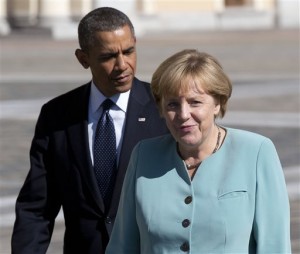Why spy on allies? Even good friends keep secrets

President Barack Obama walks with Germany’s Chancellor Angela Merkel toward a group photo outside of the Konstantin Palace in St. Petersburg in this September 6, 2013 file photo. AP
In geopolitics, even best friends don’t tell each other everything. And everybody’s dying to know what the other guy knows.
Revelations that the US has been monitoring the cellphone calls of up to 35 world leaders, including German Chancellor Angela Merkel, have brought into sharp relief the open secret that even close allies keep things from one another — and do all they can to find out what’s being held back.
The Israelis recruited US naval analyst Jonathan Pollard to pass along US secrets including satellite photos and data on Soviet weaponry in the 1980s. The British were accused of spying on UN Secretary-General Kofi Annan before the Iraq War. The French, Germans, Japanese, Israelis and South Koreans have been accused of engaging in economic espionage against the United States.
But the technology revealed by former National Security Agency analyst Edward Snowden has underscored the incredible reach of the US spy agency. And it is raising the question for some allies: Is this still OK?
National Intelligence Director James Clapper testified this week that it is a “basic tenet” of the intelligence business to find out whether the public statements of world leaders go with what’s being said behind closed doors.
What might the Americans have wanted to know from Merkel’s private conversations, for example? Topics could include her thinking on European economic strategy and Germany’s plans for talks with world powers about Iran’s nuclear program.
Allies often have diverging interests, and the explosion of digital and wireless communication keeps creating new ways to spy on one another. Shifting alliances mean that today’s good friends may not be sometime soon.
“It was not all that many years ago when we were bombing German citizens and dropping the atomic bomb on the Japanese,” says Peter Earnest, a 35-year veteran of the CIA and now executive director of the International Spy Museum in Washington.
News that the U.S. has tapped foreign leaders’ phones was surprising to many — the White House claims that even President Barack Obama wasn’t aware of the extent of the surveillance — and has prompted loud complaints from German, French and Spanish officials, among others.
It’s all possible because “an explosion in different kinds of digital information tools makes it possible for intelligence agencies to vacuum up a vast quantity of data,” says Charles Kupchan, a former Clinton administration official and now a senior fellow of the Council on Foreign Relations. “When you add together the Internet, wireless communications, cellphones, satellites, drones and human intelligence, you have many, many sources of acquiring intelligence.”
“The magnitude of the eavesdropping is what shocked us,” former French Foreign Minister Bernard Kouchner said in a radio interview. “Let’s be honest, we eavesdrop, too. Everyone is listening to everyone else. But we don’t have the same means as the United States, which makes us jealous.”
Protests aside, diplomats around the world know the nature of the game.
“I am persuaded that everyone knew everything or suspected everything,” Russian Foreign Minister Sergey Lavrov said of the reports of US monitoring.
And while prime ministers and lawmakers across Europe and Asia say they are outraged, Clapper told Congress that other countries’ own spy agencies helped the NSA collect data on millions of phone calls as part of cooperative counterterror agreements.
Robert Eatinger, the CIA’s senior deputy general counsel, told an American Bar Association conference on Thursday that European spy services have stayed quiet throughout the recent controversy because they also spy on the US.
“The services have an understanding,” Eatinger said.
Still, Claude Moraes, a British Labor Party politician and member of the European Union delegation that traveled to Washington this week for talks about US surveillance, was troubled by the broad net being cast by US intelligence.
“Friend-upon-friend spying is not something that is easily tolerable if it doesn’t have a clear purpose,” he said. “There needs to be some kind of justification. … There is also a question of proportionality and scale.”
Obama has promised a review of US intelligence efforts in other countries, an idea that has attracted bipartisan support in Congress.
The United States already has a written intelligence-sharing agreement with Canada, Britain, Australia and New Zealand known as “Five Eyes,” and France and Germany might be interested in a similar arrangement.
A database maintained by the Defense Personnel Security Research Center covering Americans who committed espionage against the US includes activity on behalf of a wide swath of neutral or allied countries since the late 1940s. US citizens have been arrested for conducting espionage on behalf of South Korea, Taiwan, the Philippines, Israel, the Netherlands, Greece, Saudi Arabia, Egypt, Iraq, Jordan, Ghana, Liberia, South Africa, El Salvador and Ecuador, according to the database.
